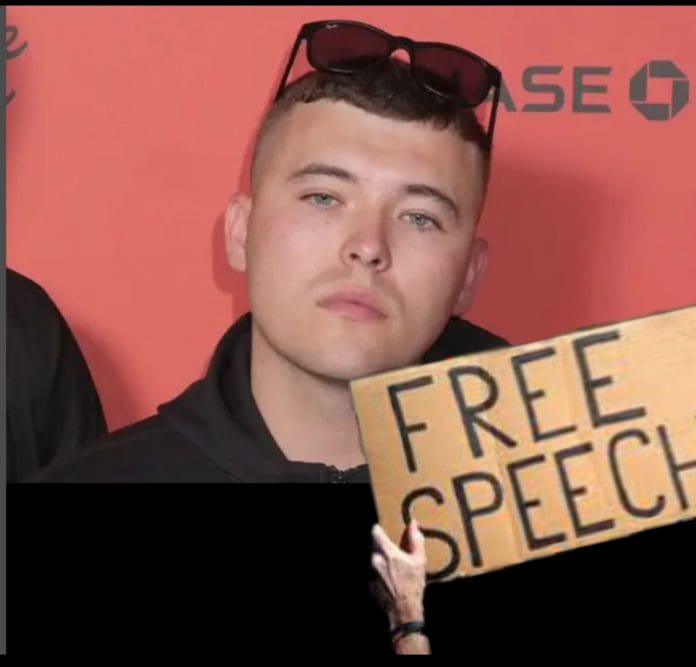Free speech is a foundational tenet of liberal democracies, heralded as a vital pillar of individual liberty and democratic discourse. Yet, in an increasingly polarised and globalised world, the line between protected expression and prohibited incitement continues to blur. The recent case of Liam Óg Ó hAnnaidh, better known by his stage name Mo Chara, a member of Irish rap group Kneecap, has reignited debate on the scope and limits of free speech, particularly when art, politics, and allegations of terrorism intersect.
The Incident
Mo Chara has been charged under UK anti-terrorism legislation for allegedly displaying a Hezbollah flag during a Kneecap performance in London last November. The incident, brought to public attention via online video and investigated by the Metropolitan Police’s Counter Terrorism Command, has resulted in the Crown Prosecution Service levelling charges ahead of a hearing at Westminster Magistrates’ Court.
Kneecap responded by condemning the charge as “political policing,” suggesting it is an attempt to “silence voices of compassion.” The group framed the prosecution as a diversion from humanitarian crises, particularly the situation in Gaza, and criticised the British establishment’s alleged complicity in global injustices. The statement was laden with political rhetoric, invoking historic grievances between Ireland and Britain, and asserting solidarity with the Palestinian cause.
Free Speech and Its Discontents
The case raises pressing questions about how far freedom of speech should extend—particularly in political and artistic contexts. Should displaying a controversial symbol, even one associated with a proscribed group, be treated as a criminal offence if done in a performance setting? Or does such enforcement risk encroaching on the very freedoms democratic societies claim to protect?
Pros of Free Speech
- Democratic Engagement: Free speech enables citizens to critique governments, protest injustice, and foster political awareness. Kneecap’s vocal support for Palestine and criticism of UK foreign policy exemplify this democratic function.
- Artistic Freedom: Artists often challenge prevailing narratives through provocation. Censoring art based on perceived offence risks stifling cultural expression and innovation.
- Platform for the Marginalised: Groups like Kneecap often speak for communities historically silenced. Free speech provides a vital outlet for alternative or subversive perspectives.
Cons and Limitations
- Incitement and Extremism: The UK classifies Hezbollah as a terrorist organisation. Displaying its symbols can be interpreted as glorifying or promoting violence, raising legitimate national security concerns.
- Social Cohesion and Public Safety: Public expressions seen as supporting violent groups can inflame tensions, provoke backlash, and lead to community unrest—particularly amid volatile geopolitical conflicts.
- The Weaponisation of Speech: While Kneecap claims their comments have been “exploited and weaponised”, footage reportedly showed the group shouting slogans supportive of Hamas and Hezbollah, both banned in the UK. If substantiated, such actions could exceed protected speech.
The Political Context
Ireland’s Tánaiste (Deputy Prime Minister), Simon Harris, condemned both Hamas and Hezbollah as terrorist entities, drawing a clear line between support for the Palestinian people and endorsement of armed militant groups. His statement underscores a common challenge: supporting a humanitarian cause without inadvertently lending credence to violent actors associated with it.
This careful distinction is crucial. Advocacy for Gaza’s civilians, or criticism of Israeli policies, should not be conflated with backing groups responsible for acts of terror. When public figures, artists, or activists blur these lines, they risk losing moral credibility and may invite legal repercussions.
Implications and Precedents
Kneecap’s case is not isolated. Similar tensions have emerged worldwide:
- In France, comedian Dieudonné has faced multiple convictions over remarks deemed anti-Semitic or supportive of terrorism.
- In the US, debates continue over whether flag burning, hate speech, or disinformation constitute protected speech.
- In Germany, support for symbols or groups linked to Nazism or Hamas is strictly outlawed, even in artistic contexts.
Each example reflects national histories and legal frameworks, but all navigate the same essential tension: the need to preserve open discourse without enabling harm.
In summary, free speech remains a cornerstone of democratic life, but it is not absolute. In pluralistic societies, especially those vulnerable to radicalisation or political unrest, speech must often be weighed against responsibilities and consequences.
Kneecap’s defiant stance challenges the UK’s interpretation of anti-terror laws as suppressive rather than protective. Whether that claim holds in court will test the robustness and the limits of artistic and political freedom in Britain today.
The case may set a precedent, not just for musicians and activists, but for anyone navigating the complex interplay between expression, identity, and power. As the world watches, the question lingers: where does legitimate dissent end, and unlawful endorsement begin?







